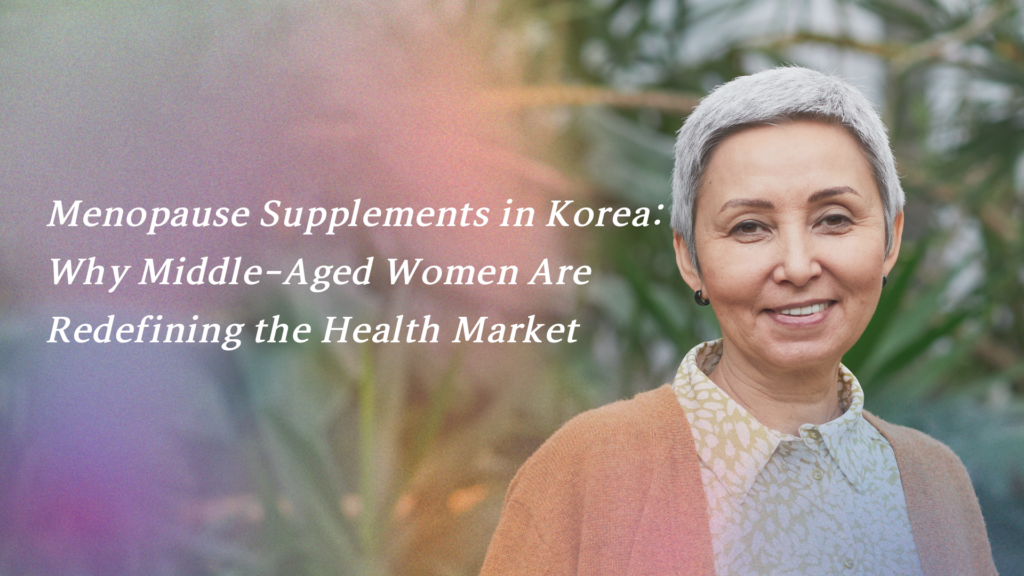
The Menopause Wellness Boom: Why Middle-Aged Women in Korea Are Driving a New Era of Health Supplement Demand
Menopause may be a biological shift, but in Korea, menopause supplements are now helping millions of women take control of their health and aging.
Korean women in their 40s to 60s are no longer passive health consumers. They’re educated, proactive, digitally savvy, and willing to invest in long-term well-being. For brands in the wellness, nutraceutical, and D2C space, this group is no longer a niche. It’s a priority market segment.
Among their growing concerns, joint pain, insomnia, and hormone-related changes are top of mind. As a result, menopause-specific health supplements are seeing a sharp rise in both demand and market innovation.
Market Snapshot: The Power of Korean Middle-Aged Women
- Over 4 million women in Korea are in the menopausal age range (45–60).
- Average annual spending on health-related products: ₩300,000–₩600,000 (~$220–$450)
- Primary purchasing channels: Online platforms (Coupang, Naver), pharmacies, health specialty stores
- High trust in KFDA-certified functional foods, especially those with proven symptom relief
In recent years, women in this demographic have shifted from being caregivers to self-care champions. These women have completed their parenting roles and are now actively purchasing menopause supplements in Korea as part of their self-care routine.
This change is reflected in search data: phrases like “menopause sleep aid,” “joint pain supplements,” and “natural estrogen support” are now frequently searched and lead to high conversion rates.
Menopause Supplement Needs in Korea & Product Development Opportunities
1. Joint Pain Relief: Glucosamine & Chondroitin Formulas
- Real-world complaint: “It hurts to go up the stairs.”
- Product insight: Combine glucosamine with MSM, curcumin, or collagen for added anti-inflammatory benefit
- Form factor tip: Use smaller tablets or soft chews—easy consumption is key for long-term adherence
2. Sleep Disturbances: Melatonin, Magnesium, GABA Blends
- Typical feedback: “I wake up multiple times at night and can’t fall back asleep.”
- Formulation idea: Pair clinically dosed melatonin with magnesium and natural calming botanicals (like chamomile or lemon balm)
- Marketing angle: Position as a “nighttime self-care ritual for moms” rather than just a sleep pill
3. Hormonal Balance: Soy Isoflavones Remain in Demand
“This helped with my hot flashes and mood swings.”
- Recommended combo: Soy isoflavones + vitamin D + folate
- Labeling note: Address estrogenic concerns directly with educational copy reassurance matters
Branding Strategy : Sell With Empathy, Not Data
In this market, empathy sells better than statistics.
These aren’t customers looking to ‘hack’ their health. They want to feel heard and supported especially when it comes to choosing menopause supplements in Korea that truly meet their needs. That’s why the most effective marketing focuses on real life moments
Messaging that resonates:
“My mom’s knees hurt more often now. I wanted to find something to help without side effects.”
“She doesn’t sleep well these days, and I just want her to feel rested again.”
Content that converts:
- Visual daily supplement routines tailored for ‘mom’
- YouTube testimonials from real women over 50
- Expert-backed webinars: How to navigate menopause with science & care
Positioning the product as something you would gift your own mother builds trust.
Distribution Channels & Tactical Recommendations
| Channel | Characteristics | Go-To Strategy |
| Naver Smart Store | SEO-heavy, intent-based traffic | Focus on symptom keywords + UGC reviews |
| Coupang Rocket Delivery | Speed, mass exposure | Subscription model + video reviews |
| Brand-Owned DTC | Control, storytelling | Use brand blog, email flows, and cross-selling with sleep/skin items |
| Pharmacy Retail | High trust, offline segment | Sampling campaigns + pharmacist co-branding |
Offline pharmacy sales are also strong in this category, especially when product packaging communicates sincerity and reliability.
Final Thoughts: This Isn’t a Trend. It’s a Shift.
What we’re seeing in Korea is more than just a spike in supplement sales. But, it’s a paradigm shift in who drives health purchasing power.
Middle-aged women are informed, intentional, and willing to invest in products that deliver real, lasting benefits. The brands that succeed in this space will be the ones that understand not only the symptoms of menopause but the emotional experience behind them.
Whether you’re launching a new product line, rebranding your supplement portfolio, or expanding into the Korean market, the message is clear: Speak to women the way their daughters would. Respectfully. Genuinely. Effectively.